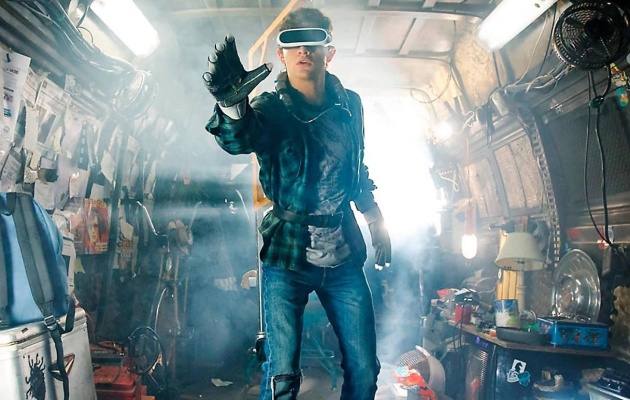Janet Sewell has written a MA dissertation on how this new technology intersects with the mission of the church. “Let’s not forget that God's message has practically always been mediated”, she says.
![Virtual Reality will become increasingly used in all societal contexts. / Photo: [link]Hammer and Tusk[/link].](https://cms.evangelicalfocus.com/upload/imagenes/6499a29647fd1_hammer-tusk-tzUJHxlAZFk-unsplashCropped.jpg) Virtual Reality will become increasingly used in all societal contexts. / Photo: [link]Hammer and Tusk[/link].
Virtual Reality will become increasingly used in all societal contexts. / Photo: [link]Hammer and Tusk[/link].
The access to an unlimited virtual world has shaped the imagination of many in the last decade.
Apple has been the latest to present a product to experiment Virtual Reality (VR) at home. Its price is not yet accessible for everyone, but the competition between the known as ‘Big Techs’ may bring a futuristic version of the metaverse to our dining rooms earlier than expected.
Should we be excited about these new immersive worlds? To what degree should churches embrace this technology? And what are the challenges for human relations in the physical world?
Janet Sewell (from Iceland) is a missiologist with a big interest in technology. She has a MA in Contemporary Missiology at the University of Gloucestershire (England), with a final dissertation titled: “Church and Mission Within Virtual Reality. An Exploration”. She told Evangelical Focus she believes “this is a crucial topic for both missiology and ecclesiology alike as VR becomes more popular and will inevitably reshape our culture in profound ways”.
Read her answers in the following interview.

[photo_footer] Janet Sewell. [/photo_footer] Question. How would you define Virtual Reality?
Answer. Virtual reality is an immersive world that is generated by computers that we, as users, are able to enter into using avatars and head-mounted devices, such as the Meta Quest or the Oculus. We then use haptic controllers to interact with these worlds. In a way, AI externalizes thinking and mimics our minds, while VR enables us to project our minds and personalities into these computer generated worlds.
We are then able to interact with other people from within our own city or with people from the other side of the world. For example, as I was exploring a VR world, I met people from India who wanted to make friends and practice their English. It was great fun and a tremendous opportunity for sharing the Gospel!
Q. Meta presented their metaverse, Google experimented with Glass, and Apple is starting to sell Apple Vision Pro. In general terms, what are the main benefits such gadgets promise to offer to us regular citizens?
A. There will be different benefits for different people depending on how they use it.
The internet, in a very real way, brought the world closer. It is much easier today to stay in touch with friends and family based around the world, and I think VR will enable us to do that but in a more intimate way.
[destacate]“Many people are addicted to their smartphones, is that more acceptable because smartphone technology is older?”[/destacate]I could see using the Apple Vision Pro, with its mixed reality technology, to have dinner with my friends, but actually see them at my table while eating their meal, and they would see me at their table eating my meal – dinner among friends and family across countries and continents. The technology isn’t there yet, but I believe that will happen in the future and I for one am looking forward to it!On a societal level, though, I think that VR will be a great equalizer. One of the things that struck me most during the Covid lockdowns is how the disabled community enjoyed them. They were finally able to interact with the world on the same level as everybody else. They were able to attend meetings, church services, and do life alongside everybody else, as the world was forced to do life from home. I think that VR has the potential of leveling the playing field for many people, not just the disabled community.
Q. To what degree do you think the evolution and widespread use of Virtual Reality will affect human relationships in 20 years’ time?
A. Right now, we can only speculate. Nobody knows exactly what will happen in the next 20 years as we start using the technology on a day-to-day basis, and how it will affect relationships. One thing is clear though, VR will reshape the world as we know it.
[destacate]“Let’s use movies but to shape our ecclesiology and missiology as we think of the future”[/destacate]As VR is set to replace physical spaces, some of these will become less relevant, for example offices. Prior to Covid, all my friends had to commute daily into their offices for work, today they go in once or twice a week and work remotely the rest of the time. VR will enable offices to be purely in virtual spaces – and I do believe that businesses will opt for that option as it will reduce their overhead costs and enable their international teams to come together into one space. Colleagues will be able to interact with one another through avatars, workers will have their own desk space where they will “sit” and do their work in VR.Other spaces will become even more relevant, like our homes. People live in large cities that are extremely expensive and accept tighter living spaces because the city is where the job opportunities are. However, what if job opportunities were virtual?
Today, we have a whole subculture called digital nomads where people work online, earn good money, but live in places like Portugal or Thailand where the cost of living is much cheaper and they can afford nicer homes to live in. With VR, I think we’ll see a lot more of that – meaning that people will start leaving the large cities for more affordable and nicer options.
What will this do to physical relationships? Only time will tell. Will we isolate ourselves further by leaving the cities, or find ourselves in smaller, more tight knit communities? It’s so easy to paint a dark scenario of doom and gloom but if there is one thing that the Covid lockdowns taught us, it is that we need human connection.
The mental health issues that we saw due to lack of human connection, despite being connected online, illustrate that we will never be able to operate fully within VR. We were socially distancing for two years and people suffered. We need community and I think that the church can have a very large role to play in a VR-saturated future as one of the few places where people interact in real life.

[photo_footer] A scene of the film Ready Player One (2018), by Steven Spielberg. [/photo_footer] Q. How do films like Ready Player One of Steven Spielberg shape our expectations of future VR technology?
A. Well, movies tend to show the negative aspects of technology. A movie where everything goes well, doesn’t sell. So, I think we’re receiving a very negative image of VR from popular movies and that is shaping our view of it. VR will definitely bring some of the dangers these movies are warning us about.
For example, the Dutch movie Play, tells the story of a teenage girl for whom it is difficult to make friends and ends up getting addicted to a game played in VR. I think that addiction to VR is a very real danger, but we have to remind ourselves that young people that are searching for escapism will always find their escape, whether it’s in VR or something else. Let us not forget that many people are addicted to their smartphones, is that more acceptable because smartphone technology is older?
[destacate]“A no-go scenario would be VR for young children, at least for now”[/destacate]What we can do as the Church is watch these movies that depict these darker scenarios, and ask ourselves the question, what could we do to help a person that finds themselves in a situation like that one? How can we be Christ to a person who is hurting so much that they feel the need to escape to a virtual world to the point of addiction? Let’s use these movies, not to fuel our fear, but to shape our ecclesiology and missiology as we think of the future.
Q. Where do you set the line between using VR well and defining 'no-go' scenarios?
A. The problem with lines is that they imply a black and white scenario, whereas I think that VR will be a gray area for many for years to come. People, churches, and workplaces will adopt VR as they feel comfortable.
For many, church will be a no-go area for VR, as they believe church needs to be an embodied experience, while others will be very comfortable with churches operating within VR as they’ll focus on gathering together in the spirit. Today, there are several churches already operating within VR, with the oldest VR church planted in 2016. So these no-go areas will depend on people’s convictions and theologies, but I think the church could use VR to reach unreached people groups, and I’m especially excited to see how the persecuted church will use VR!
[destacate]“The church can have a very large role to play in a VR-saturated future as one of the few places where people interact in real life”[/destacate]But for me, a no-go scenario would be VR for young children. At least for now. We don’t fully understand how digital tools are affecting children’s development, especially their brain development. My big fear is that, as workplaces become virtual, the kindergarten and elementary schools become virtual, depriving young children of peer-to-peer interactions along with the social skills and development that come through that.That universities take their campuses virtually is one thing and I think that’s very exciting, especially if it can make theological education more accessible. But equally, I don’t think that schooling prior to 18 should be allowed solely in VR, unless it’s part of the curriculum at the school building, not one where children are staying home and attending classes only through VR.
Q. What else would you like to add to this whole debate?
A. As the Church, let’s not be afraid of VR. Instead, let’s be part of the culture that shapes and learns how to use VR well. Let’s look at the positive sides of the technology and learn to use and adapt it to our needs. However, at the same time, let’s not be blind to the negatives but find solutions that can help the Church and society at large.
Also, let’s not forget that God has practically always been mediated, be it through people, prophets, the Bible, sermons, podcasts, radio, television, you name it. God uses the people and mediums of the day to reach out to the lost. VR is a new medium that God is already using – let’s be part of what God is doing!
[donate]

Las opiniones vertidas por nuestros colaboradores se realizan a nivel personal, pudiendo coincidir o no con la postura de la dirección de Protestante Digital.
Si quieres comentar o